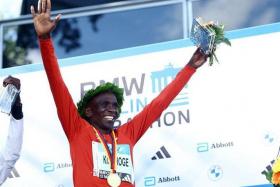'Running may be the most cost-effective lifestyle medicine'
With New York City hosting the world's biggest and most popular marathon yesterday, runners around the world were picturing its storied finish line to push for that extra kilometre.
But is running actually good for your health? Yes, say experts, as long as you are careful.
Runners are 30 per cent less likely to have a premature death and 45 per cent less likely to die from cardiovascular disease than non-runners, according to a US study published in March in the journal Progress in Cardiovascular Diseases.
They can even expect to live for three years longer, the study found. And these benefits appear to exceed that of all other physical activities.
"Running may be the most cost-effective lifestyle medicine from a public health perspective," the study's authors said.
The research analysed the data of 55,000 men and women aged 18 to 100 from a 2014 study published in the Journal of the American College of Cardiology (JACC).
"Running has many benefits. It is good for the entire cardiovascular system, from the heart to blood vessels," sports cardiologist Stephane Cade said.
Running also has a positive effect on your mind.
"It helps your mental health by producing hormones, endorphins, which give you a feeling of well-being," said Julien Schipman, a sports health specialist at France's Institute of Sport and Performance.
But even though running can be very good for your health, you need to take precautions.
"Someone who has never done it before should see a doctor for a check-up," said Mr Schipman.
Your age, weight, medical history and lifestyle - whether you smoke or drink - can all add up to make running a more risky prospect.
"After 30 to 35 years, the biggest risks are heart attacks and sudden death," Dr Cade said. "Deaths are often linked to heart disease which went unnoticed until being triggered by running."
A recent example came last month, when Tunisia's 56-year-old health minister Slim Chaker died of a heart attack while running 500 metres in a charity marathon.
Beyond heart risks, runners need to listen to their body to avoid injuries to their legs, lower back and especially their knees.
The World Health Organisation recommends adults have 150 minutes of moderate intensity physical activity, such as brisk walking, or 75 minutes of vigorous intensity activity, like running, every week.
But according to the 2014 JACC study, running five to 10 minutes a day could be as beneficial as a long jog when it comes to preventing cardiovascular disease.
The study did not find a significant difference between those who ran 50 minutes a week and those who ran 180 minutes a week - even if they ran slowly.
"The benefit is greater if you vary the pace when you run - it is better for the heart," Dr Cade said.
When you have the green light from the doctor and are ready to hit the track, there are still some rules to keep in mind.
"Avoid running in hot weather or high pollution," warned Mr Schipman.
"And it is recommended that you change your shoes every 1,000km or every year."- AFP
Get The New Paper on your phone with the free TNP app. Download from the Apple App Store or Google Play Store now


